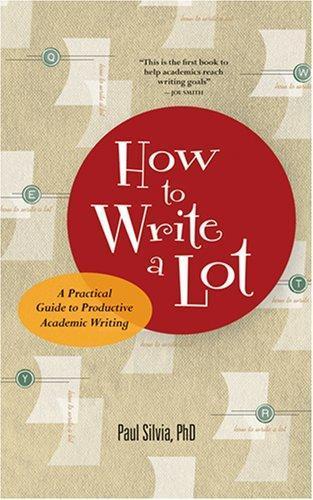UdeRecife reviewed How to Write a Lot by Paul J Silva
Review of 'How to Write a Lot' on 'Goodreads'
4 stars
Having finished this book, my first thought was to share they joy I had in reading it, taking the time to write another “I read a book I’ve enjoyed greatly” review and share it with the greater community of readers at large. For to have such an experience with a book of this sort is something that is indeed to praise, but also to deliver. How on earth is an academic book (don’t be fooled, for despite its simplicity, is still only an academic book) allowed to provide such an pleasing experience while presenting advice and guidance on a not particularly exciting subject matter, especially one that deals precisely with painful craft of writing for the academia? At one point or another your mind starts to ponder about the cognitive dissonance of knowing yourself studying a boring subject and finding a great pleasure in reading about it. Why is that so?
And the answer to this question lies precisely in the kind of help this book provides. For you are here faced with that obvious (but rarely understood truth) that the only way for one to write a lot is if one, obviously, takes the time write a lot! And having that thrown at you face, so bluntly, so honestly, lets finally your guard down and offers you a well needed pause in your anxiety and in your long standing worries about not being able to produce as much as you thought you needed to progress in the academic world. Now you can put to rest that self-blaming for having born the unluckiest of academic beings, since you had a lot to write in order to get your grades, grants, articles, and whatever else academia demands from you, but you couldn’t because you weren’t ‘cut for it’. Bollocks! And this is why knowing such a simple truth is so liberating!
By making you face that obvious truth, this book opens up a window of hope, one that can finally put you onto the path of overcoming your cronic procrastination that takes you away from becoming the writer you know you have to become in order to succeed academically.
And, for that reason, once you get motivated, confident that you can finally overcome your limitations by applying the right effort, the rest of the tips and advices the author offers you all fall naturally into place. This bring you great joy, for it allows you to read this book with pleasure, boosting your spirit in a way that only a good (and honest) self-help book can provide.
On my part, to add further is to add too little. The book is too simple for me to go through the details, luring you to think you’ll find in it more that you will. Take a look at it yourself: the book is so short; so simple; and yet so helpful, that you cannot allow yourself to pass this book without giving it a read. It takes so little to read it, but you get so much out of it, that I’m betting you’ll have the same kind of joyous experience I had while reading it. Go out and get your copy. Your future academic self will thank greatly the author for having made such a good choice. The rest in upon you for scheduling your writing sessions and for putting out your academic work on time.

